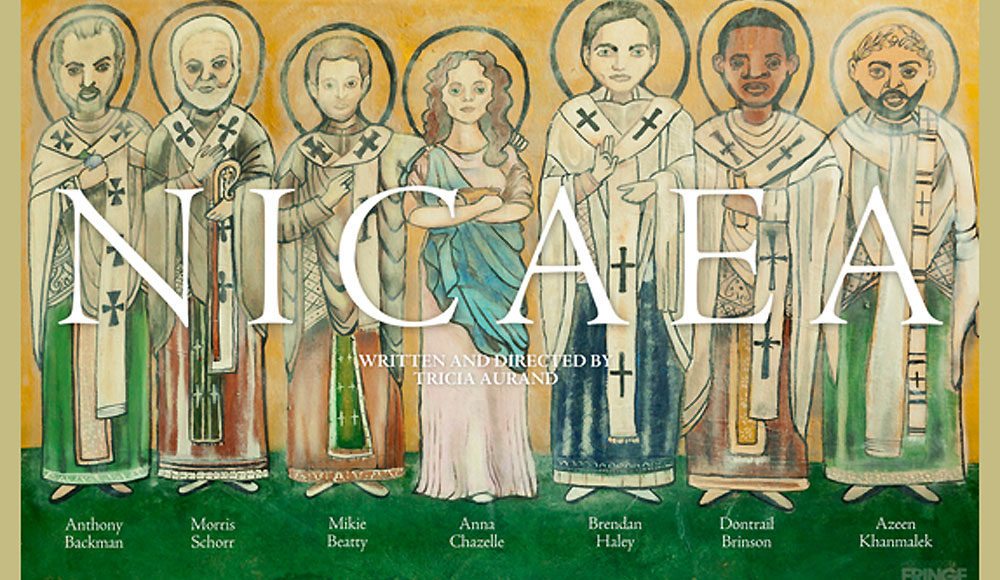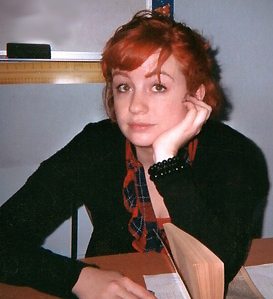 By Ernest Kearney — Now as a history junkie and one concerned and committed to addressing issues of spirituality – as anyone attending my Fringe offering this year, Ingersoll Speaks! could tell you – I must admit my admiration for Tricia Aurand’s undertaking in Nicaea. Not only does she present an historical tale, but one on a most singular topic; the First Council of Nicaea called by Constantine I in 325 AD.
By Ernest Kearney — Now as a history junkie and one concerned and committed to addressing issues of spirituality – as anyone attending my Fringe offering this year, Ingersoll Speaks! could tell you – I must admit my admiration for Tricia Aurand’s undertaking in Nicaea. Not only does she present an historical tale, but one on a most singular topic; the First Council of Nicaea called by Constantine I in 325 AD.
The intention behind the Council was to settle divisive issues within the early Christian Church and to that end Constantine, who despite the propaganda of the naissance Church, remained a pagan until upon a rather dubious death bed conversion, called together 1800 bishops from throughout the Roman Empire to gather in the City of Nicaea (present day Iznik, Turkey).
How many actually attended is debated, as is what was actually discussed. Surviving accounts are few.
The major topic confronting the learned men at the Council was the tricky issue of Christological.
And here, as always with religion, put two true believers in a room together and you open a big can of worms. Put 316 (the generally accepted number of attendees at the council) and you open a gargantuan can of worms that will propel crusades and fuel auto-de-fés for centuries.
Concepts were fiercely argued at the Council that, to modern ears, are all but meaningless: the Trinitarian Doctrine, the ontology of Christ, verbum substantivum, the Homoousion Heresy.
Today, except for the religionists, these questions have as much relevance as how many angels can dance on the head of a pin, and the great Omphalos debate (don’t ask.)
But at the time, the question of the nature of Jesus and his relation to “the Father” was a pressing one, and the Council gave us that mindboggling Church doctrine of the Trinity, aka the Father, Son and Holy Ghost, aka “Big Daddy, Junior and the Spook.”
Aurand’s play takes up the great debate of the Trinity, and even touches on syneisaktism, another of the pressing topics settled by the Council, and presents the great fathers of the Church and their adversaries.
Those with a passion for history or the Church will find this all heady stuff, but Aurand loses the larger part of the audience who are, for the most part, indifferent to either.
As the saying goes, all politics are personal; and so are all religions.
Aurand has done her homework and it shows, but she throws her focus on the debate, rather than the debaters and that’s where modern audiences have their interest.
In The Lion in Winter James Goldman doesn’t go into the arbitration panel of Berry, the Treaty of Falaise or the Great Revolt; he just pushes Henry and Eleanor into the ring and sees that they come out swinging.
Aurand, who also directs, has gathered a solid cast but they are smothered over by the doctrinal arguments of the piece. She does try to shove the historical personalities to the forefront, but she doesn’t shove quite hard enough. Azeen Khanmalek comes off well, but he plays a mad man. And Anna Chazelle stands out, but she is unfettered by any weighty dogma in need of articulating.
Still, Nicaea is both a well-crafted and well-staged piece displaying that rare duo — intelligence and ambition, which is always deserving of respect.
And for that a GOLD MEDAL.
♦ ♦ ♦
Nicaea Cast:
Mikie Beatty, Brandan Haley, Anna Chazelle,
Morry Schorr, Dontrail Brinson,
Anthony Backman, Azeen Khanmalek, Kelton Lin
Written and Directed by Tricia Aurand
Support the Voices of The TVolution
Like us on Facebook and Please Subscribe






